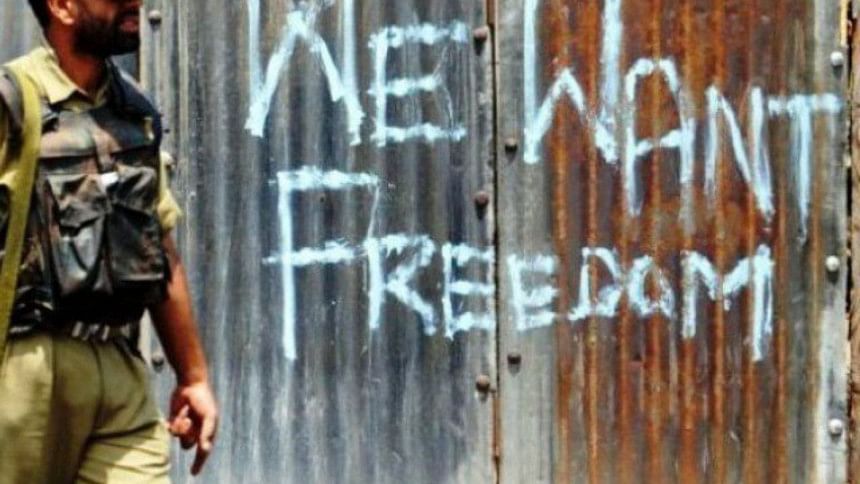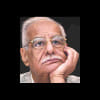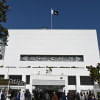A visit to Srinagar

Kashmir is normal in the sense that there are no stone-throwing incidents there. Militancy, too, is on its last leg. Yet, the valley is seething with discontent. You can taste it once you land there. It is difficult to ascribe a single reason. Many factors are responsible for it. The most important one is the general feeling that India is all over, while Kashmir had given its control only over three subjects: Defence, Foreign Affairs and Communications.
The complaint is justified because it is for a unit to surrender as much sovereignty as it likes. The federation cannot usurp more subjects on its own. But New Delhi has precisely done that. This is what came in the way of Prime Minister Jawaharlal Nehru and Shiekh Abdullah, who were close friends. The Sheikh spent 12 years in confinement. Nehru realised his mistake and had the Sheikh stay at the Prime Minister's house to make amends.
A similar problem plagues relations between New Delhi and Srinagar today. How does a chief minister stay in the good books of the centre, and give the valley a feeling of independent identity? This is a constant concern for political parties of the state.
Those who consider Kashmir as unalienable part of India want to undo Article 370, which gives a special status to Kashmir, and are betraying the Constitution on one hand and the confidence of Kashmiris on the other. Unfortunately, the ruling Bhartiya Janata Party (BJP) has a different point of view, although Prime Minister Narendra Modi has not done anything to whittle down Kashmir's autonomy. But fear continues to pervade in the valley.
This is the main reason why accession to India has come to be questioned seriously. Those who seldom received any response to their slogan of independent Kashmir in the past, have now caught the attention of many. And, not surprisingly, their number is increasing everyday.
New Delhi has to appreciate the fact that the Kashmiris' desire to distance themselves from India may not be considered in any meaningful transfer of power from New Delhi to Srinagar. Yet, the impression that the Kashmiris rule themselves has to be sustained. The National Conference waged a long war to get rid of Maharaja Hari Singh and had an icon like Sheikh Abdullah provide a secular and democratic rule to the state. But the party suffered defeat in the assembly polls because it was seen as too close to New Delhi.
The People's Democratic Party (PDP) won because its founder, Mufti Mohammad Sayyed, kept his distance from New Delhi, without alienating it. The Kashmiris voted for him because he gave them a feeling of defiance. In contrast, Omar Farooq Abdullah had to pay the price of National Conference's image of being pro-Delhi. Kashmir's links with India is too close to challenge it beyond a point. Still the opposition, however small, gives the Kashmiris a vicarious satisfaction of defying New Delhi.
Lord Cyril Radcliffe did not attach any importance to Kashmir. He was a judge in London who drew the line between India and Pakistan to establish two separate countries. He told me many years later during an interview that he never imagined that Kashmir would assume as much importance as it has in the subsequent years.
I recalled an instance when I was in Srinagar a couple of weeks ago to preside over the first anniversary of an Urdu magazine. Urdu has been unceremoniously ousted from all the states, including Punjab where it was the main language until some years ago. In fact, the language lost its importance in India soon after Pakistan made it its national language.
Kashmir feels strongly about New Delhi's step-motherly treatment meted out to the language. And it is generally believed that it is languishing in neglect because Urdu is considered the language of Muslims. If New Delhi were to own and encourage Urdu, Kashmiris would have at least one less reason to feel aggrieved.
People there are generally poor, like the rest of India, and they want jobs which they realise will come only through development, including tourism. But they themselves are not picking up guns or other weapons to drive out militants. One, they are afraid of them and, two, there is a feeling that the militants are trying to give them a sense of identity. Therefore, the criticism that there is no resistance to the militants from within the valley should be understandable because it is a part of alienation.
It is unfortunate that New Delhi did not give Kashmir the package which it had announced after the devastating flood there. There was no criticism of not honouring the promise by the media. No Indian leader pointed out to New Delhi that it has reneged from the promise. All these are interpreted in Kashmir as a deliberate sign of a cursory attitude.
I still believe that the 1953 agreement which gave India the control of defence, foreign affairs and communications can improve part of the situation in the state. The Kashmiri youth, who are angry over the state's status as well as the situation, can be won over with assurance that the entire Indian market is available to them for business or service.
But this alone may not do. New Delhi will have to withdraw all the Acts relating to the fields other than defence, foreign affairs and communications. The Armed Forces (Special Powers) Act, which was promulgated some 25 years ago to meet the extraordinary situation in the state, is still in operation. Were the government to withdraw the Act, it would placate Kashmiris on the one hand, and make the security forces more responsible on the other.
Normalcy is also a state of mind. Kashmiris must feel that their identity is not under attack, and that New Delhi realises the importance of their desire. The restoration of the 1953 Agreement which gives New Delhi the control of only three subjects could retrieve the situation which, if not attended to, may only deteriorate.
The writer is an eminent Indian columnist.

 For all latest news, follow The Daily Star's Google News channel.
For all latest news, follow The Daily Star's Google News channel. 








Comments